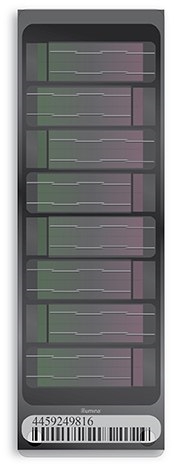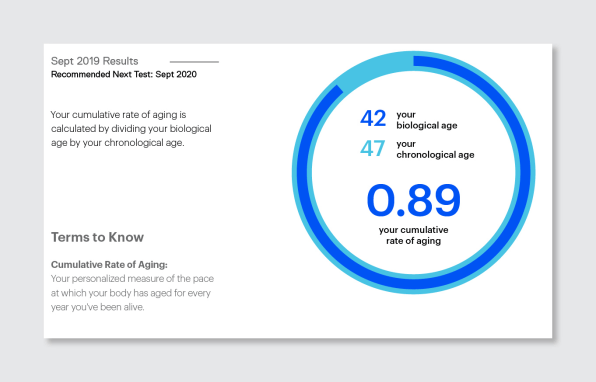How old are you really? Elysium Health will tell you—for $500
“My driver’s license says I’m [so] many years old, that’s how many trips around the sun I’ve taken,” says Elysium Health CEO Eric Marcotulli. But, he wonders aloud, “is that an accurate representation of how my body is performing at any given moment?”
Trim and fit from a combination of intermittent fasting and a fastidious exercise plan, Marcotulli is sitting across from me at the SoHo headquarters of the startup he cofounded in 2014. If it weren’t for the silver-gray in his sideburns, the 34-year-old, dressed in a stylish sweatshirt, could pass for under 30. And in fact, according to Index, Elysium’s newly developed test for biological age, Marcotulli’s health and wellness, at the cellular level, most closely resembles that of a 30-year-old.
For $500 and a saliva sample, Marcotulli and his team want to offer consumers the same self-knowledge. Starting today, at-home Index tests will be available for preorder through Elysium’s website. The tests will ship in December and deliver results within weeks, thanks in part to custom technology purchased from genetic-sequencing giant Illumina. Elysium envisions that consumers will use the information Index generates about their biological age and the cumulative rate of aging it implies to modify their diet, exercise, sleep patterns, and more. One day in the future, the company hopes to be able to provide more granular advice in realms like those, using a refined version of its epigenetic analysis, in order to help consumers increase their health spans, if not their lifespans.
However, as is often the case in the realm of anti-aging products and services, consumers using Index 1.0 will be taking a leap of faith. Although the statistical methods and science underpinning the test have generated buzz among researchers, Index itself has not been subjected to rigorous, long-term study. (The company is still validating, for example, the protocols around the test’s saliva samples. At the moment, consumers’ only direction is to avoid food or drink for 30 minutes before spitting into a small tube.) Nor is Index approved by the FDA—because the test is not a disease assessment, it does not have to be.
But those caveats are not slowing Elysium down. Thanks to companies like 23andMe and Ancestry.com, millions of people now know the basics of their own genetic profile. Genes, of course, are fixed; over the course of a person’s lifetime, they remain constant. But the way in which genes are expressed—epigenetics—is far more variable and can change based on factors like stress or smoking. Elysium, seeking to capitalize on new research connecting the dots between epigenomic processes and aging, sees that variability as an opportunity to build a business that can hook customers for decades—perhaps even their remaining adult lifetime. 23andMe, in contrast, can sell a consumer just one testing kit.
“You’re going to want to understand at least on a yearly basis, in our opinion, how your rate of aging is continuing,” Marcotulli says. If it weren’t for the current price point, he adds, he’d take an Index test “every day.”
A pill to keep you younger
Index is not Elysium’s only offering. The health startup launched its first product, a supplement called Basis designed to “support cellular health” and “change how you age,” according to the company’s website, in 2015. Basis, which costs $50 per month or $480 per year, contains two primary ingredients: nicotinamide riboside, a form of vitamin B3 found in milk, and pterostilbene, best known for its presence in blueberries. By the end of the year, Elysium expects to have sold two million bottles of pills. Like Index, Basis is not subject to FDA approval, in this case because of its status as a supplement.
Elysium developed Basis with the help of Leonard Guarente, who leads the Glenn Center for the Biology of Aging Research at MIT. Guarente agreed to join Elysium as a cofounder and chief scientist after getting a cold-call from Marcotulli, who had read about Guarente’s work and saw an opportunity to revisit commercializing it. At the time, Marcotulli, a recent graduate of Harvard Business School, was working as an investor at venture firm Sequoia Capital.
The allure of nicotinamide riboside (NR), for aging researchers like Guarente, is that it appears to shore up levels of NAD+, an enzyme that plays a central role in metabolic processes at the cellular level. Because NAD+ levels decrease with age, giving the coenzyme a boost should, in theory, make cells function as if they were younger.
The “in theory” part is important, because Elysium presents this theory in many ways as confirmed fact. On its website, the company refers to Basis as the “culmination of more than 25 years of aging research,” creating the impression that the science is complete. Elysium also includes on its website a chart from a “double-blind, randomized, placebo-controlled clinical trial” showing NAD+ increases of 40% versus a placebo, thanks to Basis.
If only it were that simple. Click through to the scientific paper in Nature Partner Journals: Aging and Mechanisms of Disease containing those results, and it becomes apparent that all but one of the authors is an Elysium founder or employee—an obvious conflict of interest. Even scientists who have received research funding and other forms of compensation from Elysium take a more skeptical posture about the underlying science.
“[NR is] one of these things that is based mostly on benefits in mouse models,” says Joseph Baur, an associate professor of physiology at the University of Pennsylvania who has had research sponsored by Elysium. “I think it’s a wide open question how beneficial this will ultimately turn out to be in humans.”
There are many reasons why an intervention might show promise in rodents but fail in humans. With NR, Baur is most interested in the question of dose translation. “One of the unique things about these NAD+ precursors is that the end goal is to change the concentration of NAD+ in the tissues, so maybe you actually have to scale by bodyweight,” he says. “And nobody is doing those doses.”
Elysium, meanwhile, has broadened its marketing of Basis’s benefits to encompass not just aging, but jet lag. In a recent article in Vogue, fashion designer Victoria Beckham endorsed it as part of her extensive health and beauty regimen.
A company eager to score wins
In its dealings with competitors, as well, Elysium has been aggressive in its pursuit of growth. In February of this year, a nutrition journal published an article implicating Basis, and specifically its use of pterostilbene, as a risk factor in increased cholesterol. One of the authors, Amy Boileau, was vice president of research and development at a company called ChromaDex during the time that the article’s research took place (the other author is Chromadex’s chief science advisor).
The article was one of many shots fired in the ongoing battle between Elysium and ChromaDex, a California-based public company that until 2016 served as Elysium’s primary supplier of NR. ChromaDex has since sued Elysium in three states—California (theft of trade secrets, breach of contract), Delaware (patent infringement), and New York (product safety and false advertising). In Delaware, ChromaDex is joined in its complaint by the trustees of Dartmouth College, where the ability to isolate NR and administer it orally first originated, according to the patents currently on file.
“Elysium Health is confident that it does not infringe any valid claim of the patents described in ChromaDex’s baseless lawsuit and trusts that the court will arrive at the same conclusion,” Elysium spokesperson Whitney Christopher said in a statement.
Regardless of how the courts rate the suits’ merits, they have brought to light Elysium’s cutthroat tactics and scorn for competitors. In an iMessage chain between Marcotulli and his cofounder Dan Alminana, included as an exhibit, the two mention ChromaDex cofounder Frank Jaksch Jr. with disdain. “[He’s] just dying to talk to us but trying to play it cool,” Alminana writes. Marcotulli responds with a suggested name-drop, billionaire Sean Parker, and taunt: “Email back to him is easy. ‘Hey [F]rank. Maybe we can chat Friday? We are headed out to Sean parkers [sic] house for the next few days. Lots of meetings set up.’”
The California suit, in particular, highlights Elysium’s eagerness to attract talent and score wins. Two ChromaDex employees, vice president of sales Mark Morris and director of scientific affairs Ryan Dellinger, left the company around the time of Elysium’s last ChromaDex order and now work for Elysium, according to the California complaint. Morris gave notice on July 16, 2016, and Dellinger resigned the following month. In an iMessage from Marcotulli to Morris dated July 12, 2016, Marcotulli writes, “Welcome to the Elysium family. We can’t wait to get started.”
(Update: In response to Fast Company’s reporting on the ongoing lawsuits, Christopher sent a follow-up statement: “Elysium is pleased with the myriad successes in the lawsuits to date despite ChromaDex’s continued and unwavering dedication to attacking Elysium’s reputation and will continue to vigorously prosecute its claims against ChromaDex. We are confident that the courts will be able to unwind ChromaDex’s elaborate campaign to deceive and undermine Elysium and the public, and that they will evaluate ChromaDex’s misconduct and Elysium’s claims accordingly.”)
Later that year, the company announced that it had raised $20 million in Series B funding from venture backers including General Catalyst and Sound Ventures, where Ashton Kutcher is a member of the investing team.
Calculating your biological age
Morris himself is the last of the Elysium team members to sit down with me and discuss Index. He brings with him a mirror-like glass slide about the length of my index finger, coated in silicon, and hands it to me across the conference table. Far, far smaller than my eye can see, the custom Illumina array contains capture mechanisms capable of reading more than 100,000 genomic sites. Each array costs tens of thousands of dollars.

But looking at 100,000 sites barely scratches the surface of the epigenetic data that Elysium could potentially capture. Across the genome, roughly 1% of genes, or 30 million sites, are turned on and off through an epigenetic process known as methylation (there are other forms of epigenetic modification, but methylation is among the most common). Methylation patterns of certain genes have been shown to correspond to specific stages of life, and so, using statistical methods, Index is able to analyze the patterns of an individual consumer and generate a “biological age.”
“Right now, we don’t know whether that’s a random error process that accumulates over time or whether it’s your body responding to different things that are happening with aging,” says Morgan Levine, Elysium’s head of bioinformatics, who also meets with me. “But regardless, we see these very strong patterns, and from that, we can build these predictors.”
In the realm of ancestry DNA tests, companies have admitted to errors and inconsistencies in the results provided to some consumers, particularly consumers with non-European family histories. Elysium maintains that it is confident in Index’s ability to serve consumers of different backgrounds.
“I think we’ve done a great job in going from a population level down to, ‘n of 1’ in terms of repeatability, making a great test,” Morris says. He also sees room for “fine-tuning” the test over time by layering in algorithms specific to subpopulations.
Because of the way Index’s biological ages are constructed, Levine says, “we can’t really put error bars around them per se.” The actual number, she says, is not as important as continuing to take (and pay Elysium for) the test over time in order to measure your cumulative rate of aging.
There are some early indications that interventions can affect biological age. In a study of nine people, UCLA geneticist Steve Horvath was able to reverse biological clocks by 2.5 years on average using an intervention that combined growth hormone and two diabetes drugs (Levine conducted her postdoctoral studies in Horvath’s lab). “Anecdotally, we can share that we’ve heard the [epigenetic] clocks have moved with significant lifestyle intervention within three months,” Marcotulli tells me.
Eat well and sleep more
To test my own biological age with Index, I followed the instructions printed in a small booklet sent to me by Elysium, along with a saliva tube. (Saliva contains a high percentage of blood cells, so in a sense I’m sending in a blood sample, minus the needle prick.) Just before lunch, when I know I haven’t had anything to eat or drink for more than half an hour, I spit several times into a plastic funnel attached to the test tube. I close the tube, place it in a plastic bag, and drop the whole package in the mail.

[Image: Elysium Health]
I’m curious to see my results, but also not expecting a major surprise. My rate of aging, according to Index, ends up being 0.94 (I’m 36 years old chronologically but 34 biologically). In other words, the methylation of my epigenome most closely resembles that of a 34-year-old. It’s about where I expected: I’ve always exercised, and I generally eat well. But with a 1-year-old son at home, I don’t have time to be fanatical about either of those factors, or about my sleep.
I page through the report that Elysium has created for me, a draft version of the one that will ship to Index’s first customers. If I had paid $500, I would likely be disappointed (if you’re already a Basis subscriber, you can get the test for $300). Most of the guidance the report contains maps to common-sense advice regarding diet, activity, sleep, and stress. It’s reassuring to have my less-than-1 score, but I haven’t learned very much about myself, or about my body’s performance. Specific tips around fasting, for example, or high-intensity interval training, would seem to be far in the future.
I ask Marcotulli what he’s learned from testing himself. “I am the type of person who, and perhaps it’s the reason I was so interested in starting this company—I want absolutely everything,” he says. “If you look at my desk, all our prototype products are sitting there. I take every test under the sun. Sometimes to compare them, sometimes for fun, sometimes to learn something about myself. That experience is really exciting.”
Aside from his biological age, he has been most affected by learning that he has the genetic variation for early-onset Alzheimer’s (through a test provided by another company). “My hope there is that we invest in Alzheimer’s research, and I follow it closely,” he says.
In the meantime, while science makes slow and steady progress, a subset of consumers, like Marcotulli and Elysium’s earliest adopters, will play the game of staving off mortality—and pay premium prices for the privilege.
“Elysium would not be where it is today if we had not chosen the path that we did,” Marcotulli says as we close our interview. “All the naysayers will be proven wrong.”
(30)



